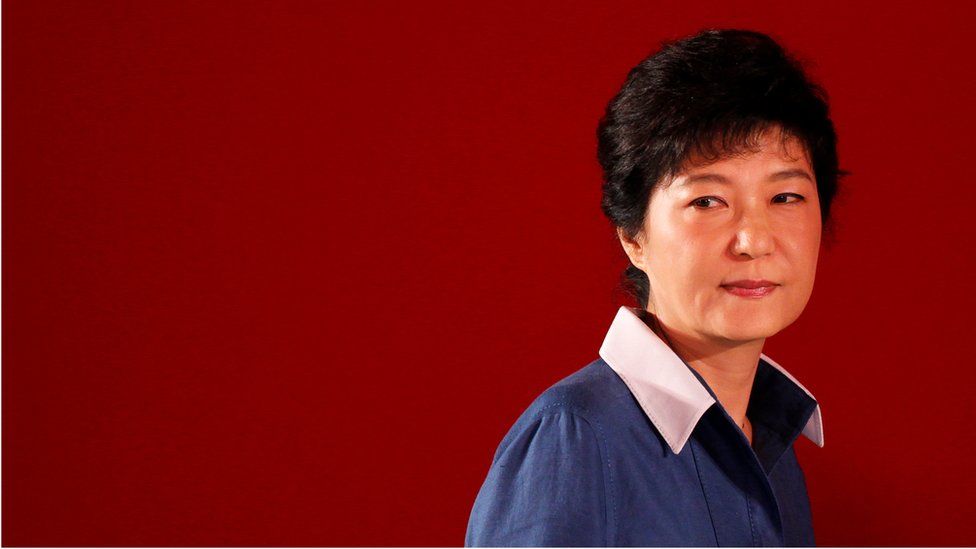Park Geun-hye: Tragedy of South Korea's first female leader
- Published

What the crowds couldn't do, parliament has. Every Saturday night for two months, hundreds of thousands of people have gathered in Seoul and chanted that the president should step down.
Park Geun-hye has been resistant. She has apologised several times, with a face of utter humility - but her fault, she said, was not keeping control of those around her.
She has severed her relations with the person she's leaned on for four decades, Choi Soon-sil, her confidante accused of controlling two funds and then pressuring companies to donate millions of dollars on the strength of her closeness to the president.
President Park has denied being involved - though the prosecutor thinks she was complicit.
It has had elements of Shakespearean drama, with the combination of President Park's power but also vulnerability. She is unmarried and so has had no children or husband to lean on - only her closest friend who she has broken with now.
She remains president until (and if) the highest court in the land ratifies the decision and strips her of her title. But all power is now stripped from her.
In the meantime, the prime minister takes over. It will be a difficult time, with a new and unpredictable president in the White House. There are already warnings that the South Korean military needs to be on heightened alert in case North Korean leader Kim Jong-un decides to test the uncertainty around power in Seoul.
The lady at the centre now has some months to contemplate her fate. If she loses the presidency, she can be tried for corruption in an ordinary court of law.
There must also be a private drama. Nobody knows the psychology of Ms Park, perhaps not even herself.
'Unimaginable suffering'
She grew up in utterly extraordinary circumstances, the daughter of President Park Chung-hee, the military strongman who took power and who then set the country on the road to industrialisation.
His wife and her mother was assassinated in 1974 by a sympathiser with North Korea, possibly even an agent of North Korea acting on orders from Pyongyang.
Their devastated daughter stepped into her dead mother's shoes as the country's first lady, performing official duties alongside her father. Five years later, her father was himself assassinated by his own intelligence chief during a drinking session.
The daughter orphaned by political violence then entered politics herself - and was nearly killed when a man slashed her face at a public meeting.
When the current President Park won the highest office in the election of 2012, she said (in clear English): "When I was just 22 years old, I assumed the unprecedented duties as our country's acting First Lady. That was because I had the responsibility to fill the void left by my mothers' death at the hands of a North Korean terrorist.
"National partition is a sorrow which touches all Koreans, but for me it brought to the fore unimaginable personal suffering.
"When I thought I had lost all hope, however, I chose to rise above my agony and pain and I tried with all my heart to fulfil my duties when the eyes of Koreans were upon me".
Her father remains controversial and divisive even today. He is reviled for the methods with which the Korean Central Intelligence Agency kept power during his rule. His agents tortured and killed critics of the government.
But he also laid the foundations for the modern industrial state which South Korea has become.
By all accounts, President Park, the daughter, adored him. She remains very defensive of his legacy, conceding the dark side of his regime while emphasising the modernisation. "Different times need different types of leadership", she said in 2002.
She has apologised for her father's iron fist but praised his achievements in his 18 years in power: "My father was criticised as a dictator but that should not overshadow his accomplishments in restructuring the country. He brought Korea out of 5,000 years of poverty. What he left unaccomplished was democratisation of the system".
Trusting too much
She has never lived outside the cocoon of power (or the gilded cage of power, depending on your point of view). As a child, for example, she went to a state Catholic school on a normal bus - but was accompanied by two body-guards.
She is studious. When she went to China in 2013, she spoke in Mandarin to Premier Xi Jinping over lunch. An aide told the local press: "Park studied Mandarin on her own, in most cases during her spare time in the evening or during weekends. As you know, she neither drinks nor plays golf. Hence, she had relatively much time to learn foreign languages before she took office".
She also has a good command of English (in a neutral, non-American accent), and French and some ability in Spanish.
And she is tough. She has spoken several times to the Korean people on television over the current crisis. She apologised for the heartbreak they had suffered for the scandal - but not admitted any role in it except trusting people too much.
She needs that toughness. She may draw consolation from the previous case of impeachment. In 2004, the National Assembly did the same to President Roh Moo-hyun as it's just done to President Park - but the judges of the High Court investigated and declined to remove him from office.
He returned and his standing in the country rose.
- Published1 December 2016
- Published6 April 2018
- Published29 November 2016
- Published19 November 2016
- Published19 July 2023